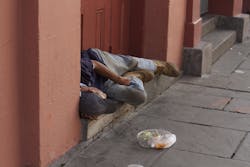Underrepresented Groups Poised to Suffer More During Pandemic and Recession
In Marc Morial's home state of Louisiana, 59.3% of those who perish from COVID-19 are African-American, a highly disproportionate number when compared with the state's white population, according to the Louisiana Department of Health.
Morial previously served as the mayor of New Orleans from 1994 until 2002, where he worked to break down racial disparities with city contracts, significantly reduced the city's crime rate and reinvigorated the tourism industry. Since 2003, he has served as president of the National Urban League advocating for economic and social justice.
The novel coronavirus, which has caused severe economic strain across the globe, has widened the cracks of adequate health care access and secure jobs to underrepresented groups. With the majority of American children not in school coupled with the skyrocketing unemployment rate, the issues among the nation's poorest are exacerbated. Morial has been working around the clock to bring awareness to the accelerated inequalities.
"What has become clear from the data is the pandemic is hitting communities of color the hardest," Morial says. "COVID-19 is affecting every single community, but it's disproportionately affecting when it comes particularly to the death rate, is communities of color – African-Americans and Latinos."
Chronic health conditions linked to marginalized communities such as obesity, diabetes and heart disease are major factors in the COVID-related deaths. Food deserts, lack of secure jobs and subsidized programs make it difficult for poverty-stricken families across the country to have access to nutrient-rich options.
Morial explains, "these conditions affect all Americans, but they disproportionately affect people who are poor, and that means also people who are African American and Latino because of the nation's long legacy of racial exclusion and people who historically have not had access to health insurance, doctors or hospitals as easily as others. We want to shine a light on this because as we begin to pivot as a nation toward trying to get back to normal, people have to understand that this challenge that we face is self-induced."
In order to move forward together as a nation, Morial calls for universal access to COVID-19 testing. It needs to be available from public housing areas to production facilities and historically-disadvantaged neighborhoods.
Once a vaccine is identified as ready for mass production, officials need to make sure that it is "universally available to every man, regardless of income."
Experts indicate that the pandemic has triggered the worst recession since the Great Depression, and it could last anywhere from 18 months to two years. Any deviation in the way the United States' public health system operates needs to be strategic and impactful.
"We need a powerful, strong, unapologetic response," Morial states. "This is going to cost the nation $10 trillion to $15 trillion for us to shift from an economic point of view and to fix the problems in the public health system. We're going to need to invest that money intelligently."
He also points to the Paycheck Protection Program (PPP) for small business owners. The U.S. Small Business Administration enacted the measure to provide $349 billion of economic relief to employers during COVID-related closures and restrictions. The program drew widespread scrutiny across the country from business owners and Americans who questioned how distributions of the fund were handled.
"We need to make sure that small businesses, mom-and-pop shops, have the same opportunity to borrow money as a larger small business," Morial explains. "We know there's a difference between a construction company with 500 employees and a small business with three to five employees."
Unemployment assistance also needs to continue for an indefinite amount of until the economy becomes stable. This is critical to the welfare of Americans.
He says, "We want to make sure that public investments are invested equitably. Don't put the money back into the same old system. We can invest the money in new and different ways. There is a range of things that absolutely need to happen."
In an election year where change is poised to occur, Morial advocates for unrestricted voting access. The pandemic has caused many state officials to limit the number of locations where Americans could cast their votes.
"We need to make sure that COVID does not become a voting suppressant," he says. "Let people vote two to three weeks before the election, not just on election day because of social distancing. Allow people to vote by mail. Allow them to have an absentee ballot. We need multiple options."
Morial concludes, "Access to the ballot box all too often in this country becomes politicized and tiresome. I'm just an old-time believer in democracy. The minute we vote, the better we are. If we get a large, large turnout, we will get a result that will be more embraced by people. These low turnout elections where people try to manipulate the electorate, prevent people from voting, hope people don't vote and they only champion certain groups of people. I just think that that's not good enough and what American democracy should not be all about, particularly in the pandemic. The voice of the people needs to be heard during this election."
About the Author

Stefanie Valentic
Stefanie Valentic was formerly managing editor of EHS Today, and is currently editorial director of Waste360.
